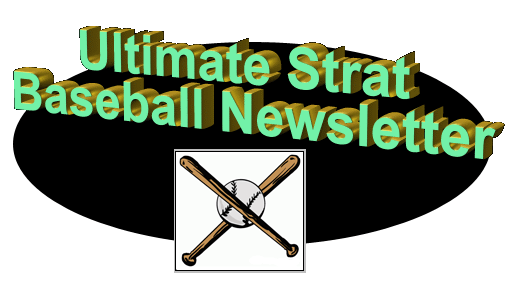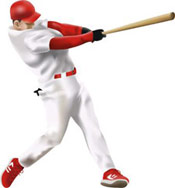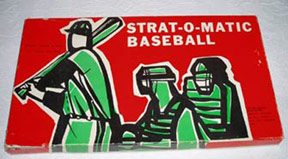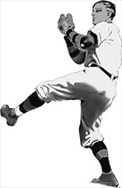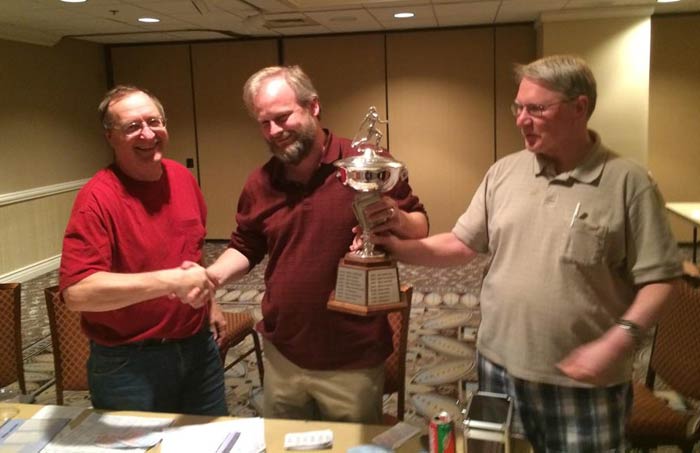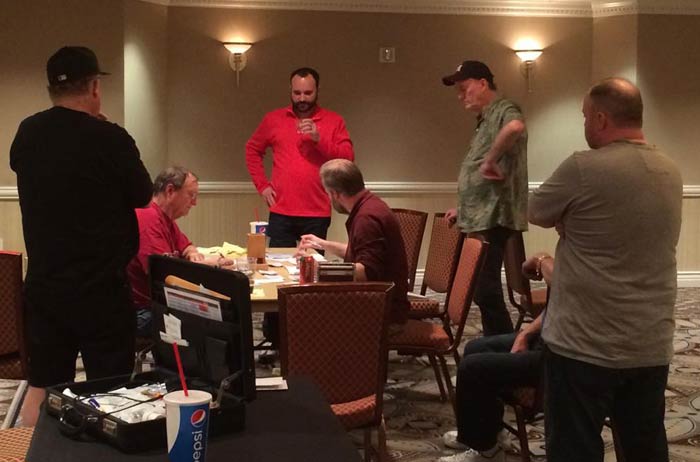First Let's Meet Sean (from the April 2014 interview)
Wolfman:
Hello everyone. As you
know, we are occasionally lucky to interview some of
the Baseball Gamers who are participating in the
very difficult draft tournaments (to win) that have
been offered by the Strat Tournaments Player's Club
(formerly known as the Star Tournaments) over a
number of years now and were victorious. For this
interview, we have a chance to speak to Sean Riley
who won the Portland Tournament, a face to face
tournament where they drafted a team of 25 players &
one stadium from the latest card set (based on the
2013 MLB season).
Sean:
I've been
a baseball fan for as long as I can remember.
Baseball and football were my favorites growing up,
though I have included other sports as an adult
(English Premier League, for instance).
Sean:
I liked the
California Angels (one of the few local sports teams
I would root for) and specifically Rod Carew and
Reggie Jackson when he came over as a FA in the
early 80s. But I started supporting the Chicago Cubs
in 1983, because of their long history of failure.
But when they won the East in 1984 thanks to my
childhood favorite Ryne Sandberg, that started me on
a lifetime of disappointment and misery. All
self-induced, of course.
Sean:
I dabbled in
semi-competitive baseball as a kid, but I was never
very good. I was a halfway decent second baseman,
but I gave up before I hit my teens.
Wolfman:
What is there about Strat-o-matic that you really
like about the game that has you involved in
tournaments? Wolfman: Are you also involved in any SOM Baseball Leagues?
Sean:
I've played various
FTF leagues in the past, but I'm only involved in a
GM computer league now, which is a remnant of an old
FTF league back where in Sacramento where I used to
live and work.
Sean:
I prefer the board
game, but I use the computer version for my league
and to kill time between tournaments.
Discussing the Portland Tournament (April 2014)
Wolfman:
Have you won other tournaments as well or was this
your first time?
Wolfman:
What type of teams do you like to draft for the Star
Tournaments? What type of ball park do you prefer?
Wolfman:
Ok for the Portland Tournament how many teams were
in your league or division? Did you have a special
strategy for this tournament, or one different then
before?
Sean:
When I drafted
Tulowitzki and Chris Davis, that cemented my
offensive strategy (played in Cincinnati). Knowing I
would play in a high-diamond ballpark, I set about
drafting as many power hitters as I could. I ended
up with 55-58 diamonds in my starting lineup vs RHP,
which was far more than any of my opponents could
manage. Sean: The last game of the regular season. I went into my last 4-game series only needing to win 1 game to ensure a playoff spot (I had won 10 of my last 11 to this point). But I lost my first three and we were in a scoreless tie in the 11th inning. Chris Davis then hit a HR against a tough lefty and I hung on to a 1-0 victory. Losing that game would have ensured at least a 3 or 4 team tie for the last playoff spot, and when you get into 1 game playoffs or shootouts, anything is possible. That was the turning point, because once I reached the playoffs my team cruised basically (which was surprising). Wolfman: How much luck was involved in your success in this tourrnament?
Sean:
Luck is always a
factor. I got really lucky in the playoffs, getting
every important dice roll I needed. I think luck
generally evens out, but you do need a little extra
on your side to win.
Sean:
Draft to your park.
Draft a balanced team, but excel in something (like
having a great bullpen, great defense, etc).
Most important: OBP
(on-base percentage) is life. Sean: Tulowitzki was a monster on defense. He saved me so many times. Same with Adam Jones, especially with his arm. Jones also won several games for me in the playoffs with his bat. Rex Brothers, my emergency second lefty in the bullpen, pitched three shutout innings in the first game of the finals which directly led to victory. Wolfman: Is there anything else you wish to share, that might be important for our members to know linked to your style of play or being part of these draft tournament that was not asked in our questions before? Sean: I was very aggressive with my bullpen, even with a fairly large leads, because I didn't want to give my opponents the chance to come back in the game. I always looked for the best match-up, and I only focused on winning the game at hand. I usually only worried about the next game when it happened. Slainte .... Sean
Wolfman:
Thank you Sean for offering to our members your
insights about keys to winning one of the most
hotly contested Strat Baseball Tournaments on
the planet. Good luck in your future adventures
(little did I
realize I would be interviewing Sean again the
following year ...) The World's Tournament (February 2015 interview)
Sean: We played in Las Vegas, on The Strip at the Flamingo Hotel and Casino. We had 45 attendees this time, which indeed was our biggest tournament of the year. Wolfman: Can you explain to our readers how the STPC tournament works and how you create the team you use in tournament? Sean: Using the current card set, players select teams in a 26-round, serpentine draft, using minimum AB/IP requirements. Depending on the number of entrants, we draft in 8-13 man divisions. Drafts usually occur on Saturday mornings right before round-robin play, but increasingly drafts will occur either on Friday nights or even on Skype sometime before the actual tournament begins. At the Worlds, we
divided into 5 9-man divisions (selected
by regional champions on Thursday
night), and drafted at 7 am on Friday
morning. Sean: No, anyone who is a member of the STPC can attend the Worlds. It's a significant investment of time and money, so usually only the best of the best make the trip, but any member is free and encouraged to play. Wolfman: I also saw that not only you won the Worlds' but you were also the Point Champion too? How many tournaments did you win in 2014? Did the points you gained from the World push you ahead? Can you briefly explain this point system? Sean: I had won 2 tournaments in 2014 before the Worlds, and I also finished 2nd in the 32-man PureStrat regional final days before. Winning the Worlds was a significant factor in winning the points title, though. Points are earned in tournaments based on a formula (which is posted on the STPC website) that factors in total wins, winning percentage, and playoff wins, as well as the number of tournament entrants (for those that finish 1st or 2nd). The national points title was a combination of my best 3 tournament finishes (2 wins and another playoff appearance), my best Regional Championship finish (2nd in PureStrat), and the Worlds. The Worlds accounted for nearly 40% of my overall point total, and pushed me ahead of such luminaries as Mick Van Valkenberg and Ed Killmer. Wolfman: Now, in Portland (and I will show our members these answers from April later in this interview) you drafted a team geared toward hitting and power with a hitters park with high diamonds. Did you draft a similar team at the worlds? Was this the strategy you have been using throughout your other tournaments in 2014 or does it just depend which players you get? Sean: I drafted another power hitting team this time, but the strength of my team was actually its pitching. Having determined that I could collect enough cheap power hitters later in the draft, I used my first 4 selections on pitchers, something I had never done before in a tournament. Drafting in the 8th position, I selected Matt Harvey, then came back with Clayton Kershaw and Stephen Strasburg. In the 4th I took Greg Holland as my closer, then proceeded to draft the power hitters I needed to fill out my offense. In the end, I still ended up with 46 diamonds in my regular lineup vs RHP, even having spent so many early picks on pitching. This turned out to give me a heavy advantage, as Harvey and Kershaw pitched lights out for much of the tournament, and my lineup hit enough homers to win. Wolfman: Tell us about some of the other player from your team that you drafted at the World's and why? Which ballpark did you use? How many games did you play before qualifying for the playoffs? I see 15 teams qualified for the playoffs and did Pete Nelson get a bye because he won last year? Did you have concerns about facing Pete this year?Sean: 1st off, Pete received a bye in the playoffs because he finished the qualifying rounds with the best overall record. It had nothing to do with last season's success. Anyway, in addition to
the pitchers I already mentioned, my
regular lineup against RHP was: 1.
Stephen Drew (ss); 2. Jose Bautista
(3B); 3. Brandon Belt (1B); 4 Wil Myers
(RF); 5. Colby Rasmus (CF); 6. Dioner
Navarro (C); 7. Neil Walker (2B); 8.
Marlon Byrd (LF). It wasn't very fast
and didn't have a ton of on-base, but
again it featured enough power and
slugging to score when necessary. I
played in Philadelphia, which favors LH
hitters As a 3-time World Champ, Pete is always a difficult competitor to face. I never ended up facing him in the tournament, though, as he was in a different division, and then he lost to Mike in the Semifinals.
Wolfman: At any time during
the tourney was there some key moments where
if you had lost the game or series against
you opponents you might not have made the
finals - I saw on the STPC website you had Sean: In the series against Mick, I won 2 games 1-0, including Game 5. Game 5 featured so many missed split rolls by both teams that the result could have swung either way very easily. Against John K, I was up 3 games to 1 when I hit into a triple play in the first inning of Game 5. I only scored 2 more runs total in Game 5 and 6, and I was afraid that play would be the turning point. However, in Game 7, Drew and Bautista hit back to back 6-5 HRs off Estrada and I was able to win. In the finals against Mez, I was up 2 games to 1 but struggling to score in Game 4. With 2 out and nobody on in the 5th, my pitcher Ricky Nolasco hit a double off Andrew Cashner's card, which led to 7 runs in the inning, capped off by the 1-5 HR 1-3, out the rest, Grand Slam from Dioner Navarro. That basically clinched the game and the title. Wolfman: Did anything happen to you during the tournament where you knew or saw a sign that you were destined to be the champion? Were you nervous at any time during this tournament? Sean: I was constantly nervous throughout the tournament. I only scored an average of 2.5 runs a game in the first 8 games, so I was afraid I wouldn't score enough to win. I shifted my lineup around a bit, which seemed to spur more offense. I felt like my team was good enough to win the title, but you never know what can happen in a short series. Your opponent can have a good team, get a few timely rolls, and suddenly you're done. After Navarro hit that grand slam, though, I could taste victory. It was the kind of lucky break you need to win a tournament like this. Wolfman: I see you played Mike Meszaros for the finals and crushed him 4 games to 1 - what type of team did Mike have - how were you able to defeat him so easily? Sean: I wouldn't say it was easy. I had won the 1st two games of every series I played, but everything just came together against Mike. Mez's team had a lot of on base and hit points, guys like Carpenter, Cano and Allen Craig, and playing in Miami (I played in Philadelphia). I took advantage of my home field advantage and my edge in pitching. Mez simply wasn't able to score a lot of runs, and I got the lucky rolls I needed. Wolfman: What would you say were the keys to your success? Did any of your players perform very well? Do you have the stats of your team throughout the tournament - how did your team do hitting wise and pitching wise? Sean: Matt Harvey and Clayton Kershaw were amazing. They probably had 3 bad starts combined between the two of them the whole tournament. They especially performed well in the playoffs, with Harvey pitching a CG to win the title. As far as offense, everyone played a part. I know a lot of people were cursing Stephen Drew, so he was probably the offensive star, but everyone hit at least some. Wolfman: Were there any trends you noticed at the World's how people were drafting their teams? Like did more participants go with a hitting team verse a pitching team, etc .... In the draft who were considered the top 10 players from the 2014 cards (based on 2013) that were picked?
Sean: No, I didn't
notice any trends really. Everyone has
their own tastes and tendencies. Wolfman: Sean is there anything else you wish to share about your experience at the Worlds, that was not asked before that our members might be interested in. Or why would you recommend for our members to join a STPC tournament in the future (whether attending in person or playing online via Netplay or Skype)?
Sean: The Worlds is an
intense and rewarding experience every
year. Winning the Worlds was the
fulfillment of 30 years of tournament
experience, dating back to junior high
school. It's a great social experience
too, as the STPC is full of a lot of
great guys and great competitors. Wolfman: Do you think that now that SOM Tours has become the E.A.S.T. region of STPC, that this is a good development which has brought the SOM gaming community back together to have the best touraments?Sean: It's going to be great to have the East represented again. I think we all have the common goal of growing a successful national organization of the best Strat players. I look forward to seeing those guys online and at the Worlds next January. Wolfman: Lastly Sean, if any of our members might wish to contact you what is the best way to do so? Sean: Email is the best way at: rileysean81@yahoo.com. If you want to know more, feel free to ask. Wolfman: Thank you Sean for giving to our members insights about the 2015 STPC World's tournament and how you achieved your victory. Continued success in 2015 and who knows you may meet me one day on-line or in person in Portland - be ready :-)
Sean: Sounds good.
Thanks again.
(NOTES from the Wolfman:
I have always found
that when we have contacted some of the key organizers our
council members of STPC in the past they have been very friendly
and helpful. One of the best ways to learn how to play SOM
Baseball is to either attend one of the STPC live tournaments
and play against some of the most knowledgable players or try
the Skype or Netplay tournaments. Last summer, I had a
chance to participate in the Skype tournament held by Purestrat
and met some incredible other strat gamers as well as was proud
to make the playoffs since in my two attempts at the midwest
Star tournaments didn't go well. Also the STPC website is
at:
http://www.strattpc.com/
or also head over to read the interview with the West Region
Council Member, Jim Gary who won the Los Angeles Tournament in
the early part of this month, to view Jim's interview click
here.)
♦ RETURN TO NEWSLETTER MAIN PAGE ♦ REPORT, "BILLY SAMPLE CHALLENGE", Ex-Major Leaguer Billy Sample accepts our challenge to play Bryan Swank, one of our members in a best of 3 games series in SOM as Billy takes the 1983 Texas Rangers, a team he was a member of, verses Bryan's 1983 Red Sox. Read the full report, which comes in three parts and also watch the video recorded by Mark Wasserman. ♦ INTERVIEW with JIM CALLIS, Senior Writers MLBPipeline.com (MLB.com), as Jim discusses his feeling about key young players who will be a factor in the 2015 MLB Season. ♦ INTERVIEW with RAY MURPHY, General Manager of Administration at BaseballHQ ♦ INTERVIEW with JIM GARY, Council Member of the Strat Tournament Player's Club, West Region ♦ SOM BASEBALL WORLD NEWS with WOLFMAN SHAPIRO, editor of "The Ultimate Strat Newsletter" discusses the latest Baseball products offer by the Strat-o-matic Game Company, Recommendations of on-line Projection Systems for the performance of Major League Baseball Players in the upcoming season, a summary of the recent new Videos Ultimate Strat has released on their Youtube Video Challenge and what is "The Bruce Foster Challenge" that is underway. ♦ REVIEW OF KEY BASEBALL PUBLICATIONS with WOLFMAN SHAPIRO -- Wolfman gives to our member a review of the latest strategy guides and books published which includes "Bill James Handbook 2015" (Acta Sports with Baseball Info Solutions); "Ron Shandler's 2015 Baseball Forecaster" (Baseball HQ) and the "Rookie Review, 2015 Edition" (Stratogists.com).
♦
RECOMMEND
ON-LINE SOM RESOURCES -- On-line Strat-o-matic and Baseball related websites
♦
BOOKS TO
DIE FOR and Become a BASEBALL GURU -- This page
is specifically about special books we are finding that either will
expand your insights about the game of Baseball, help you in the
creation of your current league teams or with your replays and
learn more about the Strat-o-matic
Baseball Game and Game Company's
history. We
have a special arrangement with Acta Sports, who is
Wolfman Shapiro
To Sign Up and Become a Member of this Newsletter
|
